This is part 2 of a 6-part series on emotional eating: how I used to be a severe emotional eater, how I overcame my stress eating issues, and how you can stop stress eating, starting today.
- Part 1: How I Overcame Emotional Eating, Part 1: Food as a Symbol of Love
- Part 2: How I Overcame Emotional Eating, Part 2: Deep Entanglement
- Part 3: How I Overcame Emotional Eating, Part 3: Becoming at Peace with Food
- Part 4: 12 Signs of Emotional Eating (And Why It is Bad For You)
- Part 5: How To Stop Emotional Eating, Part 1: Tackling the Causes of Emotional Eating
- Part 6: How To Stop Emotional Eating, Part 2: Rebuilding a Healthy Relationship with Food
Dependency on Food
“Gluttony is an emotional escape, a sign something is eating us.” — Peter De Vries

(Image)
My childhood conditioning made me very dependent on food. Every time I did something, I would need food as a companion.
For example, whenever I was stressed, I would reach out for food automatically. Be it finishing an assignment, studying at the last minute for exams or doing work, I would immediately reach out for food, which would then fuel me on my to-dos. If I didn’t have food, I wouldn’t be able to finish what I intended to do. I would either fall asleep or be stuck, like a deer caught in the headlights.
Even when I was not stressed, I would reach out for food too. I could be playing games, watching a movie, watching TV, chatting on the phone, or hanging out with friends, and I would feel the need to eat. I would feel weird, or even angsty, otherwise.
And the times when I felt happy, eating would come to mind as well. Say, when I received good news, when I got things done, or even when I just felt happy in general. Eating seemed like a natural activity to follow up those situations.
An Emotional Eater
I didn’t know this then, but I was eating in response to emotions, not because my body needed it. A part of me did notice I ate more (both in quantity and frequency) (a) than others did (b) than I should. But I thought perhaps I had a big appetite, or I needed more food for my fast metabolism, or something like that. I didn’t suspect anything.
The realization I was an emotional eater finally sunk in during Jan 2011. I had put myself on a raw food trial in Live a Healthier Life in 21 Days Challenge (21DHL), and I was doing well, in terms of my adherence to the diet. I was sticking to nutritious fresh fruits and vegetables, and it was increasing my mental clarity. I also needed less sleep as I would whenever I was on my raw trials.
However, I noticed I would subconsciously reach for more food, even though I was already full from the fruits and vegetables I just ate. While I would do this in the past on other diets, I never saw it as an issue as the food I snacked on was usually junk food, which were hardly filling. I thought perhaps I was still hungry.
But with fruits and vegetables, they were highly voluminous, and I would feel extremely full after eating for a while. Even though I had no intentions to eat anymore, I kept getting subconscious triggers to eat.
It was then that I realized my eating was outside of my control – as was a lot of my eating in the past. There were clearly subconscious wirings making me eat, despite me not wanting to. While in the past I thought they were under my control, because I would succumb to the intention to eat, it became clear to me that I would still have eaten anyway even if I tried not to.
My desire to eat had taken a life of its own, and it was no longer within my control.
In retrospect, all the reasons I made up to justify my eating in the past, such as “Oh, I’m eating this because I really want to eat this.” or “I’ll eat this one last time and restart a healthy diet tomorrow.” or “Why deprive myself of things I want to eat? I should do what makes me happy.” or “I don’t think I ate enough today – I better eat more.” or “Eating will make me feel better, so I’m going to eat now.” or “Since I’m working, I deserve to eat as a reward.” or “Since I’m watching a show/movie, I should indulge and let myself eat.” etc, were merely excuses to cover up my emotional eating issues.
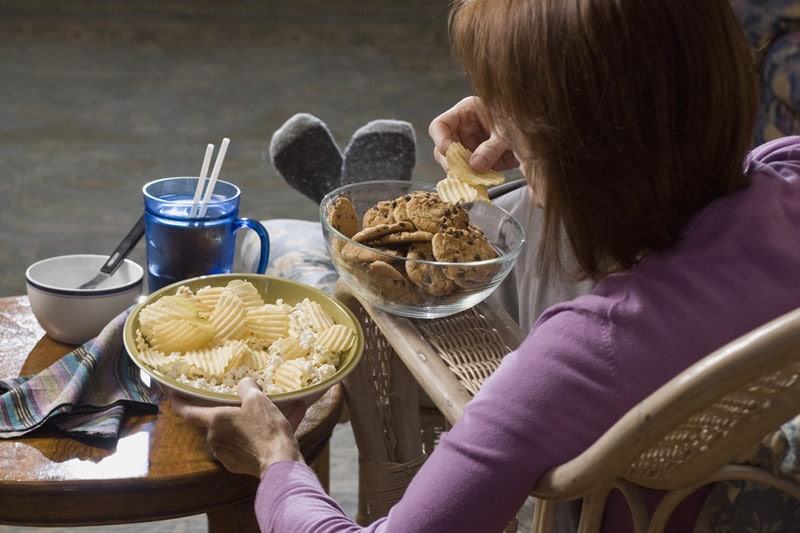
(Image)
So I would eat, in response to my emotions. Typically I would get triggered to eat when I had a lot of work to do, though my emotional eating would arise even in times of happiness or leisure. Whether it was boredom, stress, anxiety, excitement, or happiness, I would eat as a way of calming those emotional states.
After eating, I would feel happy and satisfied. If I didn’t eat in response to my eating urges, I would feel angsty and not be able to do anything else.
Eating… A Fleeting Satisfaction
Eating soothed me. It had a calming effect on me when I wasn’t calm. It made me feel content when I wasn’t contented. It made me feel happy when I was plagued by unhappy thoughts.
Before I ate, there would be anticipation as I thought about how I was going to eat soon. I would be excited about the food I was going to have.
Then as I consumed the food, there would be a surge of happy emotions, as I savored my bites. This was likely a combination of euphoria due to addictive agents used in the junk food (if I was eating junk food), and an illusionary fulfillment due to my warped beliefs surrounding food.
This satisfaction would last throughout the eating. For a while after I finished eating, I would be content.
But the satisfaction would be short-lived. It wouldn’t be long before I found myself reaching out for food again – even if I had eaten a fair bit. Sometimes I would feel like eating again after half a day, before meal times. Sometimes I would feel like eating after just a few hours. Sometimes the urge to eat would arise after a few minutes.
It was not quite right. It almost seemed like my desire to eat had little to do with physical hunger. How could I be hungry almost right away after I was done eating? Could I be going crazy?
I was exasperated.
From Emotional Eating, to Compulsive Eating, to Compulsive Overeating
I gradually evolved from being an emotional eater (eating in response to emotions), to a compulsive eater (where I would constantly feel like eating), to a compulsive overeater (where I would eat beyond the point of being comfortably full).
My emotional eating became bingefests, in my attempt to calm my emotional states.
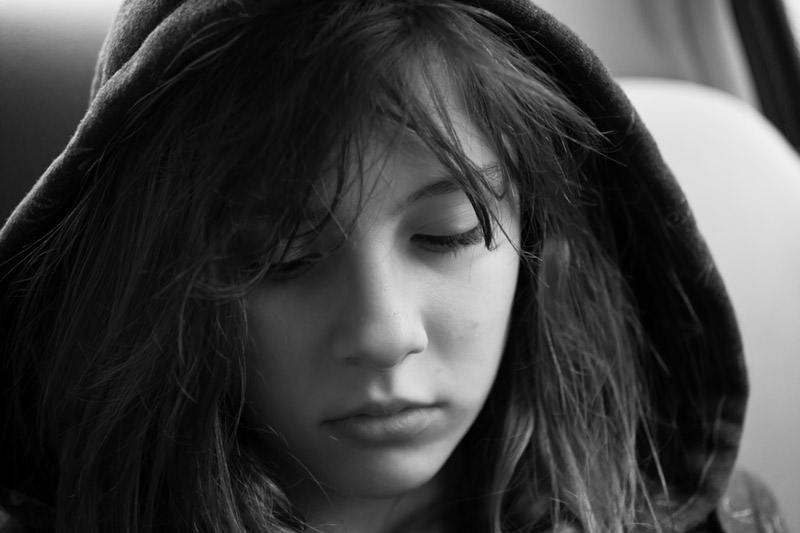
(Image)
While my emotional eating could be triggered by anything (from happy emotions, to negative emotions, to boredom), I found my binges (deliberate attempts to eat to the point of extreme fullness) were usually triggered out of anger (at myself) or feelings of depression (usually stemming from low self-esteem).
For example, if I fell offtrack in my diet by eating something I shouldn’t have, I would retaliate by eating obsessively, as if I was punishing myself. I would think, “Since I already ate that cookie (for example), how does it matter if I ate 20 more cookies? Might as well just eat myself to death while I’m at this.“.
I would also binge when someone gave me credit for doing well on my diet, even though I wasn’t (such as if I overate the night before or if I ate something I shouldn’t have). Or if the person commented I was eating little when I knew it wasn’t the case (with my secret binges). I would feel that I didn’t deserve the comment and I was living a facade, and then retaliate by bingeing.
Another example would be when I felt conscious about my looks. If I ever felt fat or ugly, I would drown myself in food. I would think, “Since I’m already so fat, what’s the point of being conscious of my food intake? Might as well overeat to oblivion.” or “All these efforts are pointless. I’m never going to achieve my ideal look. Let’s just eat and forget about this. The fatter, the uglier, the better.”.
Even comments that I was thin, if made in a period when I had binged or fallen offtrack on my diet, would make me binge. I would think that I would have been way ahead in my diet plans if I hadn’t gone offtrack, and turn to food to mend my sorrows.
As you can see, my emotional eating was heavily compounded due to issues with body image. This was because eating, weight, and image were tied to one another – a slip in my eating habits would trigger a domino effect.
However, even if I had no issues with body image or weight whatsoever, it still wouldn’t erase the fact that I had emotional eating issues, due to the way I was brought up, as I shared in Part-1: Food as a Symbol of Love. Emotional eating was a very serious problem that was causing me a lot more anguish than I realized. To live a life where I was at the mercy of food, constantly thinking of eating – and feeling angsty if my desire to eat was not met – it was no different than being a slave of food.
Bingeing… Alone, and During the Night
Bingeing wasn’t something I was proud of. It represented a loss of control, a moment of weakness, incompetence, an emergence of a dark side of me I never knew was there (or didn’t want to know).
Hence, my binges typically happened at night, when I was by myself, safe in my room. I would secretly plan for time alone so I could binge to my delight.
There was a warped perception in my mind that if I ate alone, *and* if I ate at the end of the day (say, late at night), the food wouldn’t count into my daily caloric intake. The bingeing and “loss” of control would also not count as my “real” self, or my “real” life, whatever that meant.
The bingeing was a part of my life which I saw as totally separate. There were times when I would be satisfied with myself for sticking to my plan in the day, then eat freely at night.
So in the day, I would be extremely “well-behaved” in following my diet plan. I would eat proportionately, sometimes even lesser than others. Sometimes people would even comment I was eating little, that I was very “disciplined” in my food intake.
Of course, that was not true at all. They didn’t know what was happening behind closed doors.
Night time, when I was by myself, was when things would change.
Massive Eating Sprees
During my binges, I would eat like crazy, no holds barred.
There would be all kinds of food in my home, so getting food wasn’t a problem. Even if there wasn’t enough food, I would even go out, late at night, just to buy food to binge. There would be provision stores open till late. Even if not, there was a 24 hour McDonald’s less than 10 minutes’ walk away from my home back in Singapore. Or in worse case scenarios, there were always 24 hour food delivery services, though I never had to turn to that.
My binges had no limits. I could eat all kinds of food, from snacks, to small bites, to proper meals. The objective was to eat as much as possible, in a bid to offset my unhappy emotions. I could easily finish up the food at home during each bingefest (which would be a whole lot). It was as if there was a bottomless pit in my stomach.
Food-wise, my binges were typically of crap food. The crappier, the better. Some examples would be chips, chocolate, ice cream, bread with peanut butter, pastries, cake, fries, fried food, fast food, and highly acidic coke/diet coke to top it off. These food would be dense in calories, nutritionally empty, and perfect as a tool for self-punishment. Even when there was healthy food in the house, I would deliberately avoid them and go for the unhealthy food.
Clearly, I was abusing my body terribly with the bingeing. I would stuff as much as I could until I couldn’t take it anymore. At the end of it all, my stomach would hurt from all the food I had eaten.
Intense Feelings of Shame, Anger and Self-Hate
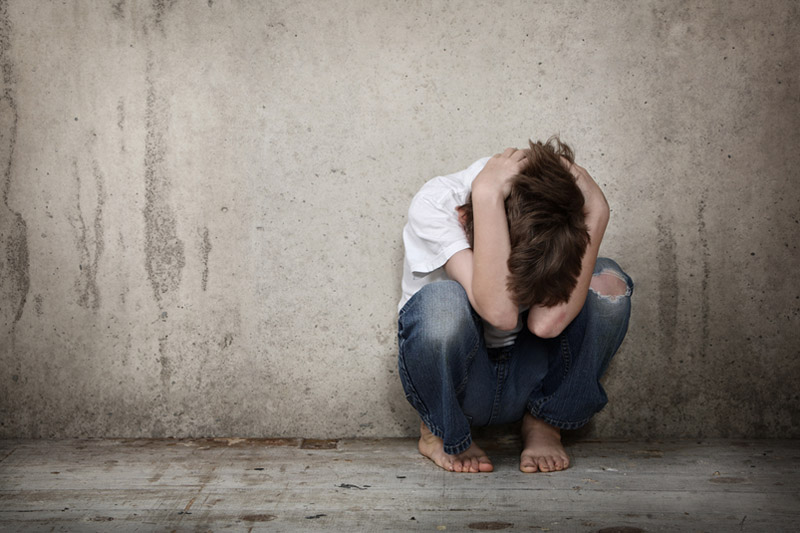
(Image)
After each binge, I would feel massively grossed out. Sick would be an adept word to use.
A lot of times I would go to sleep right after I was done because I didn’t want to face myself or the world anymore. I would be deeply ashamed of the atrocity I just committed. I would want to hide in my bed and disappear into my dreams.
Many times, I would tell myself the upcoming binge was the last one, except it never was. It would somehow continue the next day or after a few days, after something set me off into eating again.
In the period I was a compulsive overeater, I had an intense phobia of weighing, especially if I had binged in that period. No matter what the scale would say, I would berate myself for it, because I knew it could be so much better if I had not binged at all. Weighing was akin to judgment day.
I would avoid social outings and appointments sometimes, especially if I had binged the day / few days before. Beyond being conscious about how I looked (I would feel I was growing too fat from my binges, even though I probably looked no different than usual), I felt I could not face the world because I had let myself down by bingeing. I would cook up some excuse and not go out.
I was ashamed, self-inferior (where my looks and weight were concerned), sorely lacking in self-esteem, angry, and intensely in-hate with myself.
These feelings of shame would trigger me to binge further. It was a self-enforcing cycle. I would binge out of self-punishment and self-hate, which would lead me to feel utterly disgusted with myself, which would then lead to more bingeing.
I felt I was living in some kind of nightmare that would never end.
Longingness For It To End
Towards the later years of my emotional eating journey, I just wanted it to end.
Physical Implications of Overeating
Physically, it was worrying. Extra calories and implications on weight aside, overeating was clearly detrimental for the body.
There were times when I would observe myself bingeing and feel genuinely worried, because my eating was clearly out of control. After each binge, my stomach would feel pained. My stomach walls would feel stretched from the excess food that I ate despite being beyond comfortably full.
I couldn’t help but think I was going to die from bingeing someday, unless I did something about it.
Mental Weary
Mentally, I was worn. I was tired of playing tug-of-war with food.
To constantly be triggered into eating, then resist myself because I didn’t need to eat, then cave in and eat later on, then feel bad for eating more than I should – it was tiring. It was as if I had a wiring that was loose in my mind, because I couldn’t stop my desire to eat. There was a voice that kept telling me to eat. It was as if I was a robot on crack.
Towards the later years, I got so tired that I didn’t even care anymore. I would just let myself binge when the triggers came, then deal with the aftermath the next day.
An Emotional Drain
Emotionally, it was draining.
While my bingeing started off gratifying, I would feel highly unhappy after that. As I shared above, I was feeling intense feelings of self-hate, inferiority and disgust from my actions. I was utterly miserable.
I also became less happy during the binges. The eating was no longer gratifying like in the past. If anything, I felt more and more miserable with each bite I took.
The yoyo-ing of emotions from up to down, and from down to up, and the constant resorting to food to sustain a feeling of happiness which was fleeting to begin with, was not working out for me.
Spiritual Damage
Spiritually, I could feel the bingeing episodes were eating away at my soul, bit by bit. It was clearly an action that was not in line with my highest vision for myself.
There were times when I was bingeing, when I could feel a little girl inside, weeping and pleading for me to stop. I could hear her saying I was going to die soon if I didn’t.
Even while I was inside my warped reality with food, I could see I was more obsessed about food than others around me, and the obsession was abnormal.
I wanted to get out of this loop of eating, waking up and feeling bad, then eating again, and repeating that cycle the next day. I wanted to get out of this hellhole.
It would take a while before I finally worked through my issues with food and broke out of this decade-long struggle.
Continue on to Part 3: Becoming at Peace with Food, on how I overcame my struggle with emotional eating.
This is part 2 of a 6-part series on emotional eating: how I used to be a severe emotional eater, how I overcame my stress eating issues, and how you can stop stress eating, starting today.
- Part 1: How I Overcame Emotional Eating, Part 1: Food as a Symbol of Love
- Part 2: How I Overcame Emotional Eating, Part 2: Deep Entanglement
- Part 3: How I Overcame Emotional Eating, Part 3: Becoming at Peace with Food
- Part 4: 12 Signs of Emotional Eating (And Why It is Bad For You)
- Part 5: How To Stop Emotional Eating, Part 1: Tackling the Causes of Emotional Eating
- Part 6: How To Stop Emotional Eating, Part 2: Rebuilding a Healthy Relationship with Food

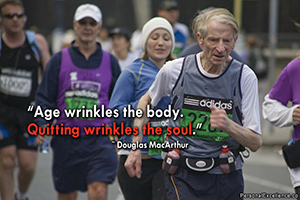
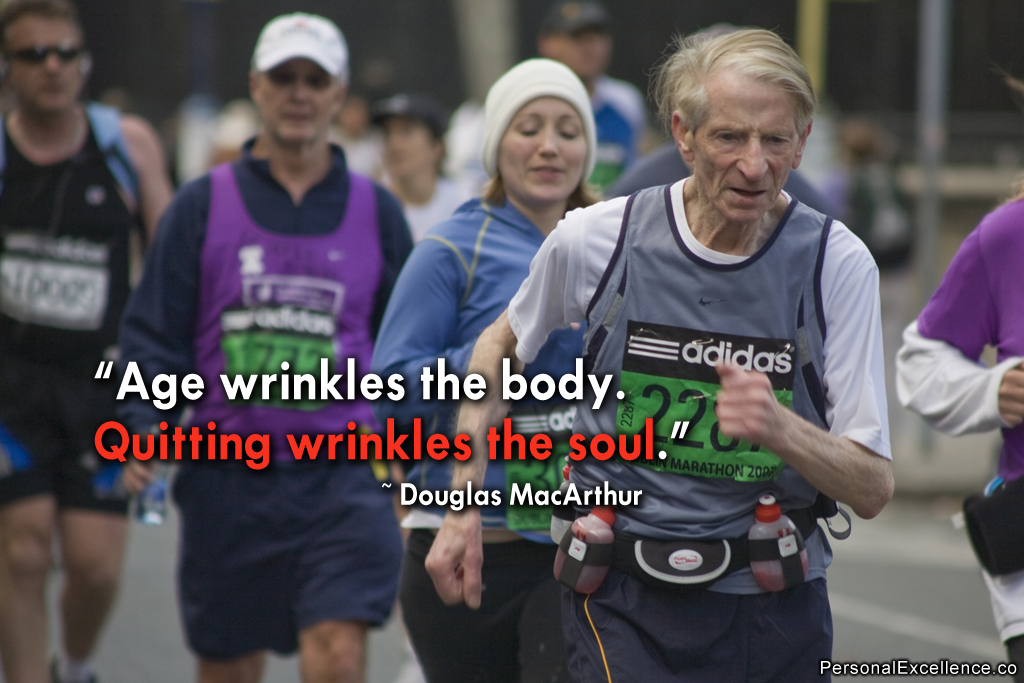



 If you like my articles, join my community of 65,000 readers and get my latest articles delivered to your inbox. Your email is safe. 100% no spam.
If you like my articles, join my community of 65,000 readers and get my latest articles delivered to your inbox. Your email is safe. 100% no spam.
Thanks Celes for sharing your story.
I also feel like sharing some points of my one, even though it is not that severe.
When I was a child, I ate until I felt fool and whatever I felt like. I was not fat in any way. But before starting to menstruate I gained some weight and had some pretty noticeable fat on my butt and hips. And I had low self-esteem and grew really conscious of that. At that point I didn’t like the way my body looked and decided to loose weight.
And I was super-cool with self control. I could eat tiny portions, usually 2 a day and tolarate the feelings of hunger. I drank wine without eating anything and then I was even slimmer the next day. By the age of 14 I was the slimmest in the class (the idea that having some muscles is attractive never came to my mind). I remember the days when I weight 38 kg with the height of 170cm.
I lost my cycle. My mother took me to a doctor, they were having a really hard time to bring my cycle back and by now it goes away if I don’t take pills and vitamins.
Then I gradually gained weight and am now 53 kg, when my ideal weight is around 51-52 kg. So I am pretty happy with my body and can’t complain.
I have emotional eating when I am stressed out, bored (less severe), or really lonely and unhappy.
I spent a year studying in the USA, and during that period I went through binge eating. I was really very lonely and anxious, studying and working at the same time and having nobody to really my concerns and understand me. It was hard for me.
From my teenage “anorexia-like” experience (I was never diagnosed, but I guess this is what it was) you can see that my slim body was very important for me. So, I could binge on some food and then purge in the toilet. No damage to my weight, isn’t that great?
Yes, when there was a holiday , I could eat all I wanted: all the cookies and buns, then drink lots of water and go to a toiled and purge it all. Like it never happened. And I was pretty happy with that, I got a lot of pleasure from the taste of those food, but didn’t put on weight. I could purge all the food in my stomach and get slimmer, having all those binges.
But, I still felt that I cannot control that. When you through up, you get red eyes, and your body retains water after that, and lips crack, and your stomach walls still get extended and you loose a lot of time (which I didn’t have). So, I decided to stop that. But was unable.
The next idea that came to my mind: if I get pleasure from the taste, why would I swallow all that stuff. I would by a huge piece of cake or bars like Kit Kat and bounty, go to my restroom, chew a bit and spit it put, until the whole cake is gone. No extra calories for me, but all the pleasure.
Not the case, the pleasure is not full, a mere illusion and I just felt terrible of all the self-pity and destructive thoughts.
When I returned from the States, I am back to my dear country, to my home and comfort zone,so I dinge and purge once in a blue moon. I can overeat and through up on holidays (OMG, remember doing this thwice in last half of year). I can binge when I am really stressed out (happend to me one Sunday after a very stressfull day at work and 4 hours of sleep before). I just wanted to eat all the foods I can’t eat for being not healthy/ too caloric/ not whole. Then I purged (wasted lots of good healthy foods :( . I didn’t feel any happier after that, just worse.
I see the roots for this behaviors:
1 being stressed out
2. being sleep-deprived
3. self-pity thoughts
4. other people eating the things I secretely crave to eat
5. feeling lonely
6. feeling that my life is empty and boring
That’s why I’m here, 3 years after you posted this and want to eliminate these patterns from my life completely.
Wow!!! I have just gotten through the very first section on Dependency on Food and it describes me to a T!! I really thought I was the only one who had some of these feelings “I would feel the need to eat. I would feel weird, or even angsty, otherwise.” We had different ways of getting to this point (we were very poor and there was rarely enough food) but so far I feel like we had similar problems. I cannot wait to get through the rest of this series. THANK YOU for helping me to feel like I am not alone in feeling this way.
Thank you for sharing your experiences on this subject. It can’t be easy opening up so honestly about something so private…
I find my own experiences in a lot of the things you’ve said. I’ve just come out of an almost 3-year session of compulsive healthy-eating… sounds weird, but it really had become a really bad obsession and it was actually turning my health for the worse, not the better… Healthy eating would alternate with heavy bingeing to bursting point….
I was trying to exercise control over my eating and my body in order to feel I was somehow in control of the rest of my life, which wasn’t really going as I wanted. Kind of a different problem than what you described, but with similar effects of restraint-bingeing-self-loathing and the same cycle repeated over and over again.
Actually a 10 day fast and your 21 Day Journaling Challenge helped me really identify the problem for the first time and realize what I was doing myself.
You might like to check out “Women, food and God”, a really good book about how and why we eat from emotional reasons. (It doesn’t really have much to do with God, that’s just the title.)
That book was another contributing factor to getting me out of my pit of despair. It’s a really good read. A bit touchy feely sometimes, but the problems described are very real.
Hey Eevee, thanks a lot for sharing about your experience. :hug: I’m sure there are others who share the same experience as you do. Part of my past experience was also similar to yours as in I would exercise to mitigate the extra calories I was taking in, and I found that my healthy eating endeavors kept getting thwarted by the bingeing.
On this note, It’s not difficult at all for me to write this series (as with all the writings on the site) because I know whatever I share here goes a long way to helping others who have the same problem. Also having resolved it, it’s no longer a shame to me – I carry the experience with happiness, whereas in the past I would be ashamed of it because it was still a lingering problem. I hold no negativity toward this memory anymore – it’s just a feeling of neutrality, as with other things I get closure on.
A big part of my problem is that I was trying to solve an unrelated problem through my eating habits oO I don’t really understand why people go for this kind of stuff, but it doesn’t seem to be a rare problem…
I was in an unhappy relationship, had just lost my favourite hobby around which my life revolved, my future was insecure, I had money worries, I didn’t know where I wanted to go in life…
The worst thing was my relationship issue, but I refused to acknowledge that it was this that was making me unhappy and causing health issues through emotional stress… instead I got onto this idea that I just had to “get healthier” and “get stronger” and everything else would resolve itself… instead of just acknowledging the actual problem and trying to solve it… oO
However the harder I tried to control my eating… the harder I would fail, the worse my binges would become, the more I would hate myself and swear to be “even more good” starting the next day….
Even after leaving my relationship the bad habits stayed with me… even though I was all around happier…
Once I identified the problem I allowed myself to eat whatever I felt like… Of course to start with I went for all the crap I’d been denying myself, but after a couple of weeks I lost interest… being allowed to eat these foods I’d been forbidding myself… no longer making them untouchable quickly made them lose their appeal… Being allowed to chose for itself my body no longer wanted the rubbish… I’d only thought I wanted it by making it into some kind of forbidden fruit… oO
Strange how the human mind works sometimes…
ice cream used to be my emotional food… i’ve slowly gone off that as I recover from major depression, trying to change a lot of habits…
Noch Noch
Hello Celestine. I had one of my revelations in the past few days, where I hit this all time terrible state of grief for eating junk and drinking too much alcohol(out of emotional attachments, not for celebratory reasons), smoking a few cigarettes and thought, what are some resources I trust to guide me in this matter? I thought about you and your blog and how helpful you’ve been in the past. Well I’m starting my own diet, a diet that was directly inspired by your 21 day fasting. I want to do a hybrid, fasting / vegan / light protein diet. I’m realizing my emotions up until now have been strongly tied to food in many of the same ways you mentioned. You don’t know what you don’t know until you know and I’m grateful you’ve found a path through it all which helps your readers that much more. Can’t wait for the third blog!
Hi Freddy, thank you so much your comment. I’m happy for you for your revelation and I’m very glad you’re taking action on it. I’m most certain you’ll find this series very useful in addressing what you’re going through. Food addiction / emotional eating, while about food, is pretty similar to attachments to other mediums like alcohol and cigarettes. It’s the same reason why many smokers would switch to being addicted to food after they quit smoking – in reality they’re just jumping from one addiction to the next. In the guide to stop emotional eating (in the second half of the series), I cover the steps to wholly address emotional eating at its root, and I hope you will find it useful.
Wow, that’s indeed a story. Emotional eating does seemmore serious than before!
I’ve never really craved for junk food but I can’t deny I make a McDonald’s trip once a month! ;)
Hi Amanda, you’re 11, if I recall correctly? You seem to have a very healthy relationship with food at your age, which is great. When I was in my early teens, I think I probably visited the fast food every day to every other day with my friends, because they were the most convenient options. Now I think they’re truly disgusting, and prefer to prepare my meals or go to a proper restaurant.
I’m 10 as of now. Next March 11. ;)
If I eat the same thing every day I’ll get tired and sick of it – whether it’s healthy or junk food. I still prefer home cooked food to restaurant food. :D
Thanks for this reflective post.
Could you explain more about how you distinguished your
needs for food from your emotional desires for food?
As a vegan (I’m vegetarian), you very well may need to eat
more often in order to maintain your productivity.
Vegetables have fewer calories and the energy from carbohydrates
tends to get used up more quickly than the calories from meat.
You very well may be exhausted as the day continues.
For mental work, a carbohydrate rush seems to be
very helpful. It seems only natural to want this energy
when you’re going to think hard about something.
I monitor my calories, and it’s apparent to me that I’m emotional eating (on top of everything I already shared in the post, such as wanting to eat when stressed/happy/bored, which are unrelated to hunger) if I keep getting triggered to eat when I’m (a) not hungry at all (b) already met my caloric needs for the day.
I could easily eat over 3,000 calories a day on a binge day, perhaps even over 4,000-5,000 calories? Definitely had nothing to do with needing the energy for mental work or from physical exhaustion. And definitely nothing to do with my veg*n diet too – I’m currently on a vegan/high raw diet and I’m more energetic than I ever was. I’m well rested after 5-6 hours of sleep, and having addressed my emotional eating issue, I now work/write very freely every day without thoughts of eating disrupting my thought stream. Where writing is concerned, I’m probably more prolific than I’ve ever been.
The reason why I kept needing to eat when I worked in the past was due to very distinct reasons, such as making myself do X when I preferred to do Y, needing food as a companion as I worked through the night, having the subconscious belief that eating = loving myself, and so on.
There have been times in my life when “(a) not hungry at all” seemed uncorrelated with “(b) already met my caloric needs for the day.” When living in Japan, I calculated that my vegetarian meals were providing about 1,000-1,250 calories/day if I ate all that I could comfortably at meal time, and were lacking in protein and fat. That left snacking to fill up the rest. I could easily eat slice after slice of bread with peanut butter, or nearly a whole roll of crackers, or bowl after bowl of granola. My digestion took a turn for the worse, and I never was sure whether I really needed the extra calories and nutrients or was just trying to stimulate my palate.
I’m glad your experience was easier to discern, and I admire you for breaking free of the cycle. I wonder if your other readers have found that having more satisfying meals reduces between-meal cravings.
Hi Chestnut, you’re definitely right – sensation of hunger is not necessarily correlated with meeting of caloric needs, and hence why I stated them as separate points. Though I’m really citing them more for those who are have trouble discerning if they are eating out of emotion or out of need. For me, it was very apparent that my eating was due to emotional eating, not out of physical need, simply because I was constantly feeling an urge to eat, even if I had just eaten. I was eating/snacking so often that it was ridiculous, and my calorie intake for the day would always exceed what I needed to consume, unless I overtly monitored/restricted it. In the later stages of the emotional eating journey, I felt like I was a robot on crack, like I stated in the article.
Also while we’re talking about veg*n diets, I thought I should also mention to others reading this that my eating triggers/issues were present since many years ago, before I became vegan, and before I became vegetarian. It was a prevalent issue that was not diet-related and had been with me for a good part of my life, till I resolved it recently.
I love this!!! I’ve read the first part and now the second. It’s so relatable, and really motivates me to start eating better! i think you’re such an inspiration! thanks! Can’t wait for part 3! :dance:
This series of articles is one of the most important reading that I have ever done in my life. I am looking forward to next articles. I can relate almost to all the symptoms that you state in your articles. I strive for excellence in fitness and emotional eating just makes me feel worse, guilty, shameful, etc.
Thank you for talking writing about your feelings and helping all those who want to cope with emotional eating.
Thanks Harsh. :) I’m glad you can relate to the article, and I hope you’ll find the rest of the series helpful in overcoming emotional eating.
Hi Celes,
Thank you so much for sharing your struggle–it is a very brave thing to do, and I’m sure this will help many people!
Since my struggle with food has been the exact opposite (when I’m stressed I find it very difficult to eat and enjoy it very much with relief when I’m happy), I can see how my reactions to food or statements can be a trigger for someone who is dealing with the opposite situation.
I just wanted to apologize in case anything I’ve said about food has been a trigger at any point. It is a good reminder to be sensitive to others, since I think most people struggle with food at this end of the spectrum to some degree.
Such a great topic to write about!
~Christina
Thanks Christina. :) It’s amazing how our subconscious beliefs with food can effect our lives in such dramatic ways. It’s interesting to hear from your point of view, as someone who has the opposite reaction – not having the appetite to eat when stressed. Do you struggle or face difficulties in any way from having this subconscious wiring?
For me, my pattern is to subconsciously avoid overwhelming emotion which seems to transform into feeling sick to my stomach, making me not want to eat or causing digestive issues. So if I can pay attention to triggers and fully feel my emotions and work through them, then I feel healthy about eating. It doesn’t really have anything to do with the act of eating per se for me, it’s just that it will be harder to eat if I’m upset or I won’t have any problems eating, but my stomach will be upset. But the process you worked through is the same one I’m using–to pay attention to subconscious cues and triggers and follow my intuition. Funny how that works either way!
Hi Celes, I can relate to what you’ve written about those night time binges! Junk food is addictive. Biscuits, chips, chocolates and so on.. You can never stop at just eating one.
Hi Glenn, what you said! I read a recent study (which I will share in Part-7 of the series) about how junk food has been shown to be as addictive as heroin or cigarettes. It showed that rats which were fed junk food would eat compulsively, consuming double the calories as rats fed healthy, regular food. Not only that, they would go after junk food at the risk of their safety, overcoming electric shocks just to eat them. I thought it was a very revealing and interesting study – certainly provides some food for thought. (no pun intended)
That’s interesting. And you’ll have as many as 7 parts in the series? That’s a lot. I thought part 3 would be the final in the series.
I guess the night time binges could be prevented by not owning a car and not living close to night supermarkets, take away joints and convenience stores. Of course not having any junk food at home either.
It’s tracking 7 parts at the moment. Long, but after conscious evaluation I found that each part is necessary to deliver the point across. And I think this is a very important topic which had a big role in my life previously, so I want to dedicate as much resources as I can to help others who are stuck on this path and looking for salvation (as I was). The personal sharing is 3 parts, and the other parts include a comprehensive guide on how to overcome emotional eating, etc. It’s like how my other series (moving on from relationships, improving relationship with parents, etc) are structured – first personal sharing, then step-by-step guide.
On the night time binges, true that not owning a car, not having junk food at home, etc would help mitigate the situation, though those are more symptom-resolution methods. In that someone with a neutral/healthy relationship with food will still not have night time binges even if he/she has a pack of chips in front of him/her, while an emotional eater may still go all the way out to buy food (like I was) even if the food is not readily available. In Part-5 of the series, I share how to address emotional eating via tackling the very root of it.
Commenting for this post is closed.